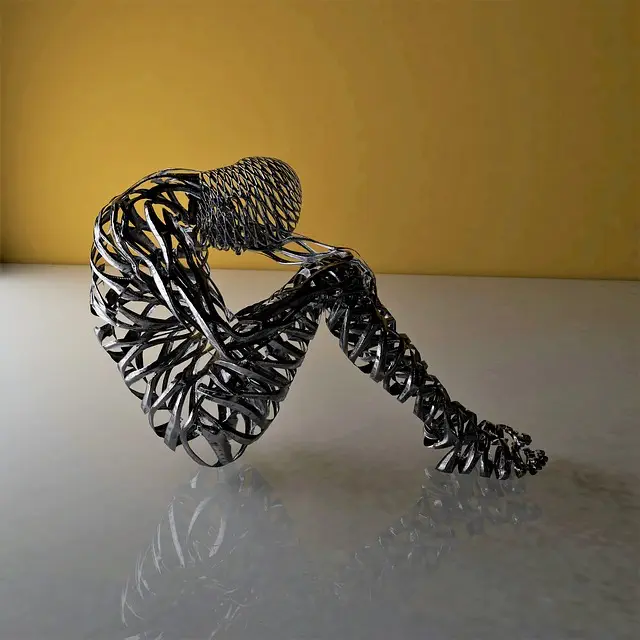Anxiety disorders encompass a range of conditions characterized by significant anxiety impacting daily life, including generalized anxiety disorder, panic disorder, and social anxiety disorder. Effective management involves lifestyle adjustments, cognitive-behavioral therapy, and medication, with muscle relaxation being key due to its role in managing symptoms. Kratom, derived from the Mitragyna speciosa tree, has gained attention as a natural substance that may help with muscle relaxation and alleviate anxiety symptoms through its alkaloids' interaction with opioid receptors, providing sedative and pain-relieving effects. While research is ongoing, user experiences with kratom vary, highlighting the need for careful consideration and professional guidance due to its complex effects and legal status. Integrating kratom or other muscle relaxation techniques into a comprehensive treatment plan can be beneficial for individuals with anxiety disorders, contributing positively to their overall well-being. It's important to consult healthcare professionals before using kratom to ensure it's used safely and effectively as part of an individualized care strategy for managing anxiety and related muscle tension.
Anxiety disorders affect millions globally, often accompanied by persistent muscle tension that can exacerbate the condition. This article delves into the interplay between anxiety disorders and the therapeutic potential of Kratom, particularly its role in inducing muscle relaxation. We will explore how this natural substance can offer support, not just for the mental anguish of anxiety but also for the associated physical symptoms. Subsequently, we’ll examine the benefits of Kratom in managing anxiety and discuss comprehensive support systems that integrate Kratom-induced muscle relaxation for a holistic approach to wellness. Understanding these connections is crucial for those seeking alternative methods to alleviate the burdens of anxiety disorders.
- Understanding Anxiety Disorders and the Role of Muscle Relaxation
- Exploring the Benefits of Kratom for Anxiety and Muscle Tension
- Comprehensive Support Systems for Managing Anxiety with Kratom-Induced Muscle Relaxation
Understanding Anxiety Disorders and the Role of Muscle Relaxation

Anxiety disorders encompass a range of conditions characterized by frequent and intense anxiety that interferes with daily life. These disorders, including generalized anxiety disorder, panic disorder, social anxiety disorder, and others, are complex and multifactorial, often requiring a comprehensive approach to management and treatment. One critical aspect of this approach is muscle relaxation, which can be facilitated through various methods, including lifestyle modifications, cognitive-behavioral therapy, and in some cases, pharmacological interventions. The role of muscle relaxation in addressing anxiety cannot be overstated; tight muscles and chronic tension can exacerbate feelings of anxiety, creating a negative feedback loop. A natural substance that has gained attention for its potential muscle relaxant properties is Kratom. Derived from the leaves of the Mitragyna speciosa tree, Kratom contains alkaloids that may interact with the body’s opioid receptors, leading to sedative and analgesic effects. While research on Kratom is ongoing, some users report its efficacy in relieving muscle tension and aiding in the management of anxiety symptoms. However, it is crucial to approach any supplement or herbal remedy like Kratom with caution, as it can have varying effects based on dosage, individual biochemistry, and legality depending on jurisdiction. Professionals should guide individuals considering Kratom for muscle relaxation, ensuring that they are fully informed of its potential benefits and risks. Incorporating muscle relaxation techniques, whether through natural substances like Kratom or other therapeutic practices, into the support system for those with anxiety disorders can be a valuable tool in their overall care plan.
Exploring the Benefits of Kratom for Anxiety and Muscle Tension

Kratom, a tropical evergreen tree native to Southeast Asia, has garnered attention for its potential therapeutic effects, particularly in alleviating symptoms associated with anxiety disorders and muscle tension. Users report that certain strains of kratom can induce a state of calmness and tranquility, which may be beneficial for those experiencing heightened levels of anxiety. The active compounds found in kratom leaves, known as mitragynine and 7-hydroxymitragynine, are believed to interact with the brain’s receptors, leading to a modulation of mood and a reduction in stress-related responses. This can result in a significant improvement in emotional well-being and a sense of peace for individuals who consume it responsibly.
In addition to its mental effects, kratom is also recognized for its analgesic properties, which can be particularly advantageous for those suffering from muscle tension or chronic pain. The alkaloids within kratom are thought to bind to opioid receptors in the body, providing a natural way to mitigate discomfort and promote muscle relaxation. This dual action of addressing both mental and physical symptoms makes kratom a compelling option for those seeking holistic support for anxiety disorders. However, it is crucial to approach its use with caution, as the regulatory status of kratom varies by region and its long-term effects are still being studied. Individuals considering kratom for anxiety and muscle tension should consult with healthcare professionals to ensure safe and effective use within the context of an overall treatment plan.
Comprehensive Support Systems for Managing Anxiety with Kratom-Induced Muscle Relaxation

When confronting anxiety disorders, individuals often seek comprehensive support systems to alleviate their symptoms effectively. One such approach that has garnered attention is the use of kratom for muscle relaxation, a method that can be particularly beneficial for those experiencing heightened tension and stress associated with these conditions. Kratom, derived from the leaves of the Mitragyna speciosa tree, interacts with the body’s opioid receptors, which can lead to sedative effects and a reduction in muscle pain and spasm. This natural substance has been reported by some users to provide significant muscle relaxation, which is crucial for anxiety management as muscular tension often accompanies anxiety disorders.
It’s important to approach the use of kratom with caution, as it is a potent compound that requires careful dosing and consideration of individual health factors. Healthcare providers should be consulted before integrating kratom into an anxiety support regimen, as professional guidance ensures safe and effective use. Additionally, comprehensive support systems for managing anxiety should include a holistic approach, encompassing therapy, lifestyle changes, and possibly the judicious inclusion of natural supplements like kratom for muscle relaxation. These systems can be tailored to each individual’s unique needs, optimizing their overall well-being and providing effective tools to cope with the challenges posed by anxiety disorders.
In conclusion, anxiety disorders present complex challenges that can significantly impact daily life. The article has explored the intricate relationship between anxiety disorders, muscle tension, and the potential benefits of incorporating Kratom into a comprehensive support system for muscle relaxation. It is clear that Kratom may offer relief from both the psychological distress and physical discomfort associated with these conditions. A robust support system further enhances the efficacy of Kratom-induced muscle relaxation in managing anxiety. As with any treatment, it is crucial to consult healthcare professionals when considering Kratom as part of an anxiety management plan. With a nuanced understanding and appropriate medical guidance, individuals can navigate the therapeutic potential of Kratom for muscle relaxation in the context of anxiety disorders.






